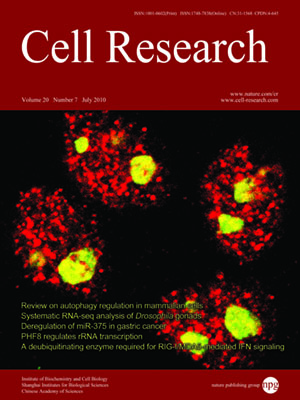
Volume 20, No 7, Jul 2010
ISSN: 1001-0602
EISSN: 1748-7838 2018
impact factor 17.848*
(Clarivate Analytics, 2019)
Volume 20 Issue 7, July 2010: 802-811
ORIGINAL ARTICLES
The ubiquitin-specific protease 17 is involved in virus-triggered type I IFN signaling
Rui Chen, Lu Zhang, Bo Zhong, Bo Tan, Yu Liu and Hong-Bing Shu
College of Life Sciences, Wuhan University, Wuhan 430072, China
Correspondence: Hong-Bing Shu,(shuh@whu.edu.cn)
Viral infection initiates a series of signaling cascades that activate the transcription factors nuclear factor kappa B and interferon regulatory factor 3, which collaborate to induce transcription of genes for type I interferons (IFNs) and other cytokines. Here we report that the deubiquitinating enzyme ubiquitin-specific protease 17 (USP17) is required for virus-induced RIG-I- and melanoma differentiation-associated protein-5 (MDA5)-mediated type I IFN signaling. Knockdown of endogenous USP17 inhibited virus-, cytoplasmic poly(I:C)- and poly(dA:dT)-induced activation of the IFN-β promoter and cellular antiviral responses. We further found that knockdown of USP17 inhibited RIG-I- and MDA5-induced but not downstream activator-induced activation of the IFN-β promoter, which was correlated with an increase in ubiquitination levels of RIG-I and MDA5. Taken together, our findings suggest that USP17 functions through deubiquitination of RIG-I and MDA5 to regulate virus-induced type I IFN signaling.
Cell Research (2010) 20:802-811. doi: 10.1038/cr.2010.41; published online 6 April 2010
FULL TEXT | PDF
Browse 2335


